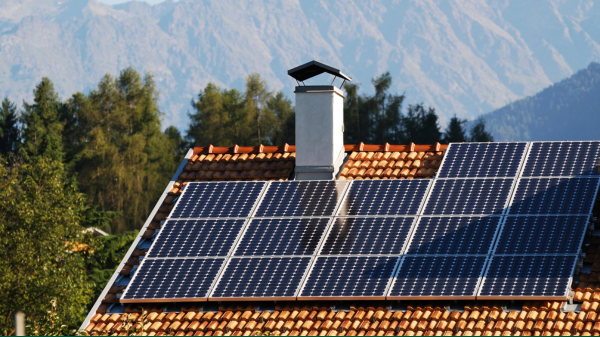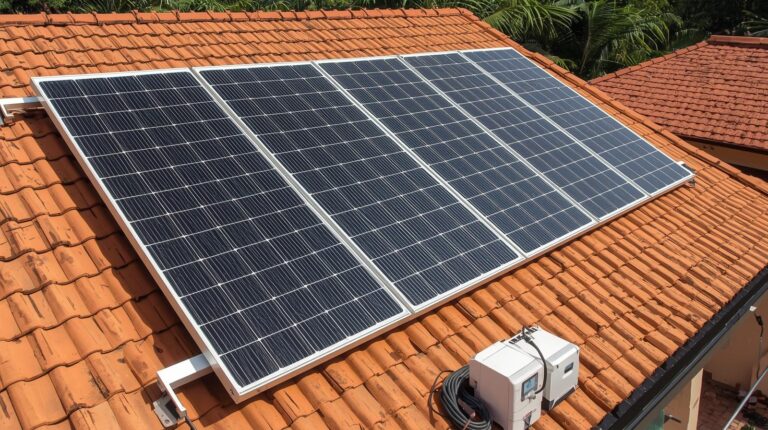In the domain of off-grid living, harnessing the power of the sun through solar energy systems offers a sustainable solution. When it comes to selecting budget-friendly off-grid solar kits, savvy choices can make a significant difference.
From optimizing energy efficiency to strategic installation techniques, there are five key tips that can pave the way for a cost-effective and reliable solar setup. By implementing these strategies, off-grid enthusiasts can access the full potential of their solar systems while keeping expenses in check.
Key Takeaways
- Prioritize energy-efficient components to save on long-term costs.
- Opt for affordable solar panels without compromising quality.
- Choose a PWM charge controller for cost-effective energy regulation.
- Select a 12V deep-cycle AGM or Lithium battery for durability.
- Invest in an inverter suitable for your power needs to avoid overspending.
Determine Power Needs
To accurately assess the power needs for your off-grid solar system, it is important to create a detailed list of all electrical devices, their power ratings, and estimated daily usage durations.
By listing out the devices you intend to power with your off-grid solar system and their corresponding power ratings, you can calculate the total energy consumption needs. It’s essential to take into account not only the power ratings but also the duration for which each device will be used daily to determine the overall power needs accurately.
When compiling your list of devices, prioritize energy-efficient appliances to keep your electrical usage as low as possible. This will not only help in reducing costs associated with setting up a solar system but also guarantee that your off-grid setup is sustainable in the long run.
Additionally, based on the devices you plan to power, evaluate whether an inverter is necessary to convert the direct current (DC) electricity generated by your solar panels into alternating current (AC) for use by your devices.
Purchase Efficient Components
When setting up your off-grid solar system, the first step is to carefully select and purchase efficient components that are essential for maximizing performance and cost-effectiveness. Begin by investing in budget-friendly solar panels, such as 100W polycrystalline panels, to ensure peak power generation without breaking the bank.
Pair these panels with a PWM charge controller, which efficiently regulates the flow of power from the solar panels to the battery, extending the lifespan of your system.
For reliable power storage, opt for a 12V deep-cycle AGM or Lithium battery. These batteries are designed to withstand deep discharges and provide long-lasting energy storage for your off-grid solar kit.
Additionally, select an inverter that suits your power needs to convert the DC power stored in the battery to AC power for your devices.
Optimize System Installation
Properly optimizing the installation of your off-grid solar system is necessary for maximizing energy efficiency and overall performance. To achieve this, strategic placement of solar panels is crucial to guarantee maximum sunlight exposure.
Utilizing appropriate mounting hardware and angles can significantly boost the efficiency of solar panels by optimizing their orientation towards the sun. Secure wiring connections play a pivotal role in preventing energy loss and maintaining system efficiency over time.
When installing solar panels, consider potential shading from nearby objects such as trees or buildings. Adjusting the placement of panels to minimize shading can greatly improve the system’s overall performance.
Additionally, regular cleaning and maintenance of solar panels are necessary to maximize energy production and extend their lifespan. By paying attention to these installation factors, you can enhance the energy production capabilities of your off-grid solar system and ensure peak performance for years to come.
Ensure Long-Term Sustainability
Ensuring long-term sustainability of an off-grid solar system requires careful consideration of component lifespan, future upgrade planning, and regular maintenance practices. Solar power systems consist of essential components like panels and batteries that need to be durable and long-lasting for the system to remain efficient over time.
Planning for future upgrades is crucial to adapt to advancements in solar technology and to replace aging components. Regular monitoring and maintenance play an important role in extending the life of solar equipment, ensuring top performance.
Allocating funds for battery replacements and panel upgrades is wise to maintain system longevity and efficiency. Building a sustainable off-grid system aligned with long-term financial goals ensures continued savings and environmental benefits.
| Components | Importance |
|---|---|
| Solar Panels | Capture sunlight effectively |
| Batteries | Store excess power for later use |
| Inverters | Convert DC power to AC for use |
| Charge Controllers | Regulate the flow of electricity |
| Mounting System | Securely hold panels in place |
Reduce Energy Consumption
Implementing energy-efficient practices, such as utilizing LED lights and energy-saving appliances, is vital for reducing overall energy consumption in off-grid solar kits.
Lowering energy usage can be achieved by unplugging electronics when not in use and maximizing natural lighting. Smart power strips can help eliminate standby power consumption, leading to significant savings on electricity bills.
Properly insulating your living space and sealing any drafts are essential steps to decrease the need for excessive heating and cooling, ultimately reducing energy consumption. Monitoring energy usage regularly allows you to identify areas of high consumption and adjust habits accordingly to minimize wasteful energy usage.
Conclusion
To sum up, budget-friendly off-grid solar kits can be optimized by prioritizing energy-efficient components, strategic installation practices, and long-term sustainability measures. By carefully selecting cost-effective solar panels, a PWM charge controller, and a suitable battery, along with reducing energy consumption through smart practices, off-grid solar systems can provide reliable power while minimizing expenses. Prioritizing efficiency and sustainability in off-grid solar setups can lead to cost-effective and sustainable energy solutions.




